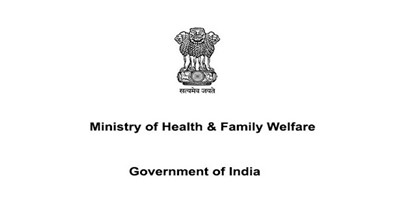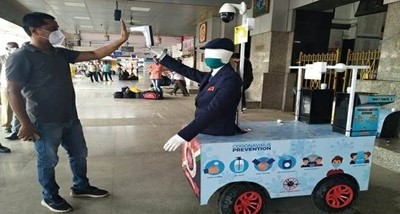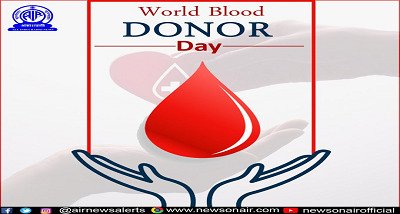Daily Current Affairs and GK | 14 and 15 June 2020

Main Headlines:
- 1. India's first infectious disease diagnosis laboratory ready
- 2. Two new symptoms have been included in the infection symptoms of coronavirus
- 3. Three-day unique Raja Praba festival started in Odisha
- 4. Government launched Aarogya Path portal
- 5. Central Railway launched an investigation facility called FebriEYE in Mumbai
- 6. Central Railway launches robotic-Captain Arjun
- 7. June 14: World Blood Donor Day
- 8. Continuous global spread of Chikungunya from India
- 9. June 15: World Elder Abuse Awareness Day
- 10. RBI appointed panel to review the ownership of private banks
- 11. Astronaut and oceanographer Kathy Sullivan became the fifth person to go to Challenger Deep
Happy February get 35% Off
Use Coupon code FEB26
1. India's first infectious disease diagnosis laboratory ready
- India's first infectious disease diagnosis laboratory is now ready.
- It is a rapid response mobile laboratory, part of the Government of India's Atma Nirbhar Bharat program.
- This laboratory has been made in record time of only eight days in collaboration with Department of Biotechnology.
- It has many facilities available including on-site ELISA, Real-Time Reverse Tranion Polymerase Chain Reaction (rRT-PCR) Test and Biochemistry Analyzer.
- This lab is capable of performing 200 tests per day of ELISA and 50 per day test of rRT-PCR.
2. Two new symptoms have been included in the infection symptoms of coronavirus
- Recently two new symptoms have been included in the coronavirus infection symptoms.
- The loss of the ability to smell and taste is included in new symptoms of coronavirus infection.
- The sample referral form currently has 13 clinical symptoms and signs that were revised last month by the ministry.
- This includes fever, cough, diarrhea, vomiting, abdominal pain, shortness of breath, nausea, hemoptysis, coughing up blood, body ache, sore throat, chest pain, runny nose, etc.
- Also, the Ministry of Health and Family Welfare has issued new guidelines for treatment of Covid-19.
- The ministry has said that the drugs Remdesivir, convalescent- plasma therapy, Tociluzimab and Hydroxy-chloroquine should be used only for defined subgroup patients of Covid-19.

(Source: News on AIR)
3. Three-day unique Raja Praba festival started in Odisha
- A three-day unique Raja Praba festival has started in Odisha.
- This festival strengthens the feeling of brotherhood in the society.
- Raja Parba is a three-day unique festival of Odisha, which is celebrated in honor of the onset of monsoon and the femininity of the earth.
- These days, as a tribute to the earth, all agricultural work such as plowing, sowing are suspended for three days.
- Odisha:
- It is a state on the Bay of Bengal in the east of India.
- It is known for its tribal cultures and many ancient Hindu temples.
- Its capital is Bhubaneswar.
- Odisha’s Chief minister is Naveen Patnaik and Governor is Ganeshi Lal.
- The state bird of Odisha is the Blue Jay or Indian roller and state animal is Sambar, while the state tree is the Banyan and the state flower is Lotus.
4. Government launched Aarogya Path portal
- Recently the government has launched the Aarogya Path portal.
- The initiative aims to establish an information management and forecasting database platform of Covid-19 at the national level.
- It will also meet demand and supply scenarios for key healthcare items.
- It will provide uninterrupted access to suppliers, manufacturers and customers for current needs and demand related to medical devices, diagnostic devices, medicines, personal protective equipment, and respiratory aids.
- This national health supply chain portal will also reduce supply chain bottlenecks during the Covid-19 pandemic.
- It will help health users such as public forums, hospitals, pathology laboratories, research institutes, medical colleges and patients.

(Source: News on AIR)
5. Central Railway launched an investigation facility called FebriEYE in Mumbai
- Recently Central Railway has started an investigation facility called FebriEYE in Mumbai.
- Under this facility, the symptoms of Covid-19 will be effectively investigated in the passengers.
- This is another important step of the Central Railway in the direction of passenger safety.
- FebriEYE, a body-screening facility have been installed at Chhatrapati Shivaji Maharaj Terminus and Lokmanya Tilak Terminus, in Mumbai, Maharashtra.
- FebriEYE is an artificial intelligence-based thermal screening system which is real-time and automated, ensures that the person entering does not have high fever.
- When passengers pass before the cameras, anyone with a temperature above the set range will be shown on a computer screen attached to the cameras in a different color pattern than the rest.
- It can detect the temperature of multiple people simultaneously and automatically record the temperature, while passengers keep moving.

(Source: News on AIR)
6. Central Railway launches robotic-Captain Arjun
- Recently, Central Railway has launched the robotic-captain ARJUN- Always be Responsible and Just Use to be Nice.
- Rabotic Captain Arjun is based on the suggestion of Alok Bohra, DIG, Central Railway Security Force.
- The Railway Protection Force, Pune has built this robot to speed up screening and surveillance.
- This robot examines the passengers boarding the train and monitors anti-social elements.
- Captain Arjun can be used for many tasks. This robot is also effective in access control and will increase the security of the station.

(Source: News on AIR)
7. June 14: World Blood Donor Day
- World Blood Donor Day is observed every year on 14 June.
- The purpose of celebrating this day is to raise awareness about the need for safe blood and blood products and to thank the donors.
- The day is an important occasion for all governments, national health officials, and the national blood services to provide adequate infrastructure to regularly increase blood collection from unpaid blood donors.
- This year the theme of this day is - Safe blood saves lives.
- The event was first organized in 2005 by a joint initiative of the World Health Organization, International Federation of Red Cross and Red Crescent Societies.

(Source: News on AIR)
8. Continuous global spread of Chikungunya from India
- A recent study has found that Chikungunya is continuously spreading globally from India.
- The study was conducted by a team from ICMR- National Institute of Virology, Pune.
- This study found that India continued to be a spatial pool for global transmission of Chikungunya virus over the period 2005–2018. The virus is spreading from India to neighboring and distant countries.
- This study has recently been published in Infection, Genetics and Evolution.
- Chikungunya:
- It is a viral disease transmitted to humans by infected mosquitoes.
- Fever and severe joint pain are its major symptoms, other symptoms include muscle pain, headache, fatigue, and rash.
9. June 15: World Elder Abuse Awareness Day
- World Elder Abuse Awareness Day is observed every year on 15 June.
- The objective of World Elder Abuse Awareness Day is to encourage the world to pay more attention to the wellbeing and adequate health care of older persons.
- Its theme this year is “Safeguard older persons during COVID-19 and beyond.”
- The day was launched on 15 June 2006 at the United Nations by the International Network for the Prevention of Elder Abuse and the World Health Organization.
10. RBI appointed panel to review the ownership of private banks
- Recently a working group panel has been appointed by RBI to review the ownership of private banks.
- The panel will be headed by RBI Executive Director P.K. Mohanty.
- The panel will also examine and review the eligibility criteria of individuals or institutions to apply for a banking license.
- It will also study the current rules on the holding of financial subsidiaries through a non-cooperative financial holding company.
- It would also suggest appropriate criteria keeping in mind the issue of excessive concentration of ownership and control.
11. Astronaut and oceanographer Kathy Sullivan became the fifth person to go to Challenger Deep
- Recently astronaut and oceanographer Kathy Sullivan became the fifth person to go to Challenger Deep.
- Kathy Sullivan was the first American woman to walk in space in 1984.
- She is now the first woman and the fifth person in history to land on the Challenger Deep, the deepest known place in the world's oceans.
- Sullivan is now the only human to reach in space and the deepest point in ocean.
- Challenger Deep:
- It is located in the Mariana Trench, below the surface of the Western Pacific Ocean.
- It is about 36,200 feet deep.
- According to the National Oceanic and Atmospheric Administration (NOAA), the average depth of the ocean is about 12,100 feet.

(Source: USGS)





 13 June 2020 Current Affairs
13 June 2020 Current Affairs 








Comments